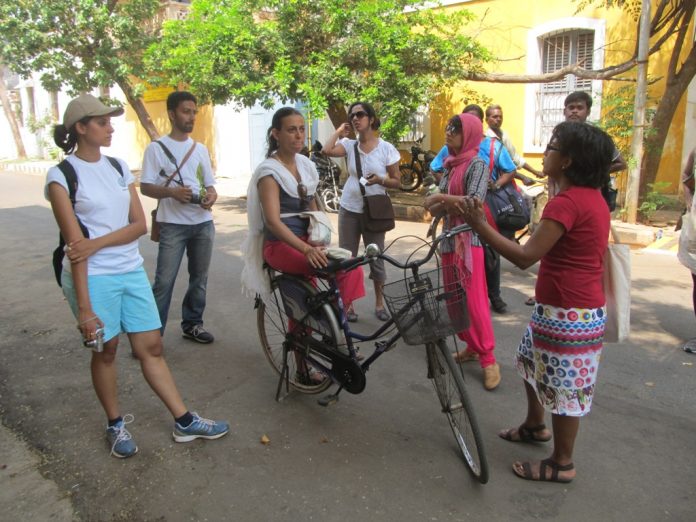This article is written by Yash Sharma, a law student at Vivekananda Institute of Professional Studies, Indraprastha University, New Delhi. This article deals with the diversity in personal laws that are currently being enforced in the territory of Pondicherry.
Table of Contents
Introduction
Pondicherry was acquired by the French colonizers in 1673. Currently, Pondicherry is one of the Union Territories in India. Pondicherry is divided into 4 districts. Among these districts, Pondicherry District has the largest area and population. The territory of Pondicherry was integrated into the Indian territory as a result of the Treaty of Cession signed in May 1956. The laws of Pondicherry, like the rest of the country, were highly influenced by its colonizers. Most of the laws were either drafted by them or by a committee constituted by them. So, personal laws underwent many changes and the result of it was an ethnic mixture of people from multiple religions living together governed by a number of civil laws. This heterogeneity of laws and people is what caused this complex intermixed model of personal laws.
This article attempts to analyze how the different personal laws in their variants work in Pondicherry. The development of personal laws in Pondicherry, in the context of present changes, are also covered in this article. Various factors that simultaneously worked on those laws and shaped the current personal laws in Pondicherry are also discussed in the article. Hindu, Muslim and Christian personal laws with all the variant that existed in French code are shaped in present laws. Its versions before unification and after unification with India, in its contemporary forms, are hard to keep track of. Finally, lawyers face a lot of problems while dealing with this complex set of personal laws.
Historical background
Before the territory of Pondicherry was acquired by the French as a colony, there were Hindus and Muslims practising their personal customs. There were some Christians too who were converted from Hinduism. The unique trait of the society was that, apart from their allegiance to a new religion, the way of living and customs that governed them didn’t change. For instance, they continued to be governed by the caste system, practised rules of marriage and divorce, and other customary laws.
After Pondicherry was acquired by the French colonizers, no structural change was made by them in the earlier daily life usages and customs. French Civil Code of 1819, when extended to the territories of Pondicherry, allowed for the natives, that were Hindus, Muslims and converted Christians, to continue to follow the customs of their respective religions. In the French Constitution of 1946 and its reiteration of 1958, it was mentioned that all the French nationals, who were not governed by the common law, that is the civil code of the country, would continue to be governed by their personal laws and customary practices. But it had to undergo some inevitable changes. Changes started to appear when earlier jurors of personal laws, who were also the head of the panchayats in Hinduism, were appointed as French law jurists. Hindu personal laws, that were hitherto vague and unwritten, got more systematized and unified under the French Administration in Pondicherry just like Privy Council in the rest of India.
Interventions by French jurists in the development of personal laws in Puducherry
The French jurists were very anxious to study and learn about Hindu Common law as they had to apply those on various matters. They faced many problems in their attempt to codify and systematize the Hindu laws. They faced difficulties because of the contradictions that were present among customary laws of various sections of the Hindu society. They followed the example of English judges who were handling a much larger responsibility of administering justice in the whole of British India while facing the same problems. Because of the differences between the English and French judicial principles, there arose some contradictions in the application of laws.
In the British model, they believed that Hindu Law should only be applied to Hindus and those converted to Christianity should be governed by their common law. On the contrary, French believed that converted Hindus would still follow Hindu customs and lifestyle and they shall continue to be governed by the Hindu law. The only variation added was that they were subjected to Christian laws in the matters of marriage, divorce and other related matters. In the case of Muslims, they continued to be governed by Muslim Law. There weren’t many complications regarding their status and administration, so they continued to follow their own customs and laws like the rest of the country.
French Civil Code
French Personal laws, in the form of the Civil Code, that came with the French regime also existed along with Hindu and Muslim Personal laws. Initially, it was applied only to those of French origin who migrated to Pondicherry. Subsequently, the French Government provided an opportunity to all, whether Hindu, Muslim or Christian, to renounce their personal laws and follow the French one. People were baited with many incentives like full political rights, attractive appointments and posts in the French army which lured them to leave their original religious status and adopt Christianity in order to be governed by French Personal laws.
Minority religious communities like that of Christianity, at that time, gave in to these incentives and changed their religious identity. Everyone who had the power to change the laws applicable to them were called ‘Renoncants’ and, even today, the French law related to marriage, divorce and adoption applies to them. By the end of the French Regime, there were three main systems of personal laws in Pondicherry: the French Personal laws, the Hindu Personal laws and the Muslim Personal Laws system. These three laws were codified to an extent by the French judicial officers.
Laws applicable after the integration of Pondicherry into India
After the Government of India signed the Treaty of Cession with the French Government, in 1956, the land was, de jure, integrated into the Union of India and administered as a Union Territory. The Treaty of Cession mentioned that the French population and the Renoncants would be protected by the Government of India but will continue to be governed by the French Personal Laws. Although the French Personal Laws were made applicable upon them, there were certain laws relating to marriage, divorce and adoption that were not made completely applicable.
Marriage under the Hindu and French Personal Laws
In 1971, The Hindu Marriage (Pondicherry) Amendment Act was passed. Section 2 of the Act was amended which excluded the Renoncants from the ambit of the application of the Act. Suyamariyathai and Seerthirutha marriages were added via amendment in Section 7. Under this Section, a mere exchange of garlands and rings was enough for a legally enforceable marriage and the presence of a priest was not required anymore. For the Renoncants governed by the French Personal Laws, the minimum age for a legally valid marriage is 18 for both the partners, unlike the rest of India.
The Prohibition of Child Marriage Act, 2006 clearly states that the minimum age for a girl is 18 and for a boy is 21 for a legally valid marriage. Although under the said Act, the marriage of minors is illegal, the Hindu Marriage Act stays silent regarding the age of the spouses. Under French Personal Laws, mere social recognition of marriage is not considered enough for its legal enforceability. It has to be proven that the spouses do not fall under prohibited degrees, and must have the capacity to get married and also should have valid consent, among other conditions for the marriage to be declared valid.
Adoption under the Hindu Law and French Legal System
Under French Personal Laws, both a Hindu and a French widow, domiciled in Pondicherry, could adopt a child. In the case of C.S. Natarajan Pillai v. C.S. Subbaraya Chettiar, the rights of the child in succession were enforced. If the mother was domiciled in Pondicherry, the adopted child had complete right to inherit from both the mother and the deceased father. In Madras, the laws state that the adoption by a woman could only be done after an appropriate consent granted by her husband.
The Hindu Adoptions and Maintenance Act, 1956 marked a milestone in the development of Hindu personal laws. Post its enactment, a widow could adopt a child who would have complete succession rights as a natural-born and could also be a coparcenary in the joint family property. This law gave relatively equal rights to the wife in comparison to the husband. The difference between the Hindu and French personal laws was that French laws were more gender-neutral from the beginning and gave equal rights to both the spouses but in Hindu Personal Laws, the position of the wife was subordinate to that of the husband and his consent had more weightage than that of a wife.
The present mixture of personal laws
As far as the application of the law is concerned, no significant changes were made. No changes in personal law, for both the French nationals and those who sought Indian nationality, were made. The Government, in conformity to the Treaty of Cession, allowed the Renoncants and those who became Indian nationals to continue to follow French Personal Laws. Indian statutes and laws can not be applied to those who continued to be French nationals and, similarly, new French laws won’t apply to those who became Indian citizens. After the merger of Pondicherry with India, many migrated there and since they were not of Pondicherry origin, the French Personal Laws wouldn’t apply to them. Due to these subdivisions within a divided society, various sections were governed by multiple laws.
Hindu law variants
Presently, there are 4 variants of Hindu Laws that are being enforced in Pondicherry. They are based on the origin, nationality and religion of Hindu customary practitioners that live in Pondicherry.
Type “A”
In this variant, the Indian statutes that regulate the Hindu laws and customary practices are enforced. This variant of law is applicable to only those who migrated from India to Pondicherry after its merger.
Type “B”
This variant of Hindu Law includes Indian statutes that regulate Hindu laws and customary practices extended to Pondicherry and special Hindu customs practised in Pondicherry. This is enforced upon Hindus of Pondicherry origin.
Type “C”
This variant includes only local Hindu customary practices and regulations. This variant is applied only to those Hindus who continued their French nationality.
Type “D”
In this subdivision, only local Hindu customs are included except for the matters of marriage and divorce. This is further divided into 2 groups to whom this would apply. Firstly, Christians, who took Indian nationality, would have the choice to be governed either by French personal laws or Special Marriage Act,1954 of India. Secondly, French Christians, who are not Indian nationals, would be governed by the French Civil Code only.
French Law Variants
We have two groups to whom the French Civil Code is applicable. Firstly, it is applicable to Renoncants, who adopted Indian nationality, but no new amendments in the Civil Code will be applied to them as they relinquished their citizenship. The principle that a person should be governed by its national laws is applicable in this case, even if they live in Pondicherry or somewhere else in the world. The second group is of Renoncants, who retained the French nationality. It is based on the same principle that they are equal to any Frenchmen or French national. The French Civil Code has followed them through various modifications from time to time.
Muslim Law Variants
Muslim Personal laws are very consistent and have no significant variations. The Muslims in Pondicherry continue to be governed with the customary laws like any other neighbouring areas. This is because the Muslim Personal law did not undergo any proper codification or systematization like other laws. There were very few statutes that were enacted which dealt with Muslim Personal laws.
How is the diverse web of personal laws problematic to lawyers?
As it is evident, that this further division within a divided set of personal laws is really confusing. It is a hard task for lawyers to handle the cases of personal laws in Pondicherry. Complications further amplify when there are cases of endogamy. In the case of personal laws, it is often seen that both the parties are followers of two different variants of law. Sometimes people under the same roof belong to different castes and each caste follows different personal laws, and it is just a mere glimpse of how complicated a case can be in such a situation.
This issue could be solved if the parties getting married decided as to which personal law they would like to be subjected to. This does not often happen because when a couple is getting married they do not think about divorce and approaching the court for any complications. Presently, it is possible to find five different subjects under different laws within a caste that is: Hindu of Indian origin, Hindu of Pondicherry origin, Hindu who are also French nationals, French Renoncants and Indian Renoncants. Among them, there can be more complex combinations of marriages and that’s how it is harder for the judicial officers to handle these cases.
Conclusion
If we ask what is a personal law, it is something that originates and develops with the beliefs of a person with the passage of time. Personal law is supposed to be intangible and one can not be separated from his personal laws and customary practices. In Pondicherry, if a person converts from Hinduism to Christianity and still continues to follow their Hindu customs and lifestyle, it ends up being confusing and awkward. Before the merger of Pondicherry with the Union of India, the French Colonizers enacted a scheme for people to get services if they adopt the French Civil Code. The French Government allowed people to follow Hindu Personal laws and lifestyle even after getting converted to Christianity. This created a situation of diversity within an already divided society of many religions and customs. Currently, as per the Treaty of Cession, no Indian statutes are applicable to those of French nationality still residing in Pondicherry. Those who sought Indian nationality can still be governed under the French Civil Code.
This mixed status of laws has been problematic for lawyers and jurists as they have to be extra careful while handling the cases of personal laws. Within a caste, there can be many people of different religions subject to different laws. All this diversity and complexity has resulted in a complex legal structure in Pondicherry today. For help with passing exams, try Exam-Labs.
References
- K. DESAI, INDIAN LAW OF MARRIAGE AND DIVORCE 123 (Lexis Nexis Butterworths Wadhwa Nagpur, 6th edn. , 2011)
- D. ANNOUSSAMY, THE FRENCH LEGAL SYSTEM 244 (2nd edn. 2011).
LawSikho has created a telegram group for exchanging legal knowledge, referrals and various opportunities. You can click on this link and join:
 Serato DJ Crack 2025Serato DJ PRO Crack
Serato DJ Crack 2025Serato DJ PRO Crack











 Allow notifications
Allow notifications


